De Engelse dichter en schrijver Robert Graves werd geboren in Londen (Wimbledon) op 24 juli 1895. Zie ook alle tags voor Robert Graves op dit blog.
Uit: I, Claudius
“This is a confidential history. But who, it may be asked, are my confidants?
My answer is: it is addressed to posterity. I do not mean my great-grandchildren, or my great-great- grandchildren: I mean an extremely remote posterity.
Yet my hope is that you, my eventual readers of a hundred generations ahead, or more, will feel yourselves directly spoken to, as if by a contemporary: as often Herodotus and Thucydides, long dead, seem to speak to me. And why do I specify so extremely remote a posterity as that? I shall explain.
I went to Cumae, in Campania, a little less than eighteen years ago, and visited the Sibyl in her cliff cavern on Mount Gaurus. There is always a Sibyl at Cumae, for when one dies her novice-attendant succeeds; but they are not all equally famous. Some of them are never granted a prophecy by Apollo in all the long years of their service. Others prophesy, indeed, but seem more inspired by Bacchus than by Apollo, the drunken nonsense they deliver; which has brought the oracle into discredit. Before the succession of Deiphobe, whom Augustus often consulted, and Amalthea, who is still alive and most famous, there had been a run of very poor Sibyls for nearly three hundred years. The cavern lies behind a pretty little Greek temple sacred to Apollo and Artemis–Cumae was an Aeolian Greek colony. There is an ancient gilt frieze above the portico ascribed to Daedalus, though this is patently absurd, for it is no older than five hundred years, if as old as that, and Daedalus lived at least eleven hundred years ago; it represents the story of Theseus and the Minotaur whom he killed in the Labyrinth of Crete. Before being permitted to visit the Sibyl I had to sacrifice a bullock and a ewe there, to Apollo and Artemis respectively. It was cold December weather.
The cavern was a terrifying place, hollowed out from the solid rock, the approach steep, tortuous, pitch-dark and full or bats. I went disguised, but the Sibyl knew me. It must have been my stammer that betrayed me. I stammered badly as a child and though, by following the advice of specialists in elocution, I gradually learned to control my speech on set public occasions, yet on private and unpremeditated ones, I am still, though less so than formerly, liable every now and then to trip nervously over my own tongue: which is what happened to me at Cumae.”
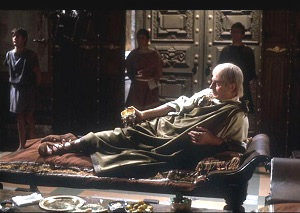
Robert Graves (24 juli 1895 – 7 december 1985)
Derek Jacobi als Claudius in de BBC-serie uit 1976
De Nederlandse dichter Johan Andreas dèr Mouw (Adwaita) werd geboren op 24 juli 1863 in Westervoort. Zie ook alle tags voor Johan Andreas dèr Mouw op dit blog.
Omhoog zien naar de zon de waterrozen
Omhoog zien naar de zon de waterrozen,
Kinderlijk, alsof ’t Rafaels eng’len waren;
Grauw slib en wijde schem’ringen bewaren,
Die hier de dood stilde tot smartelozen.
Opzuigt de bliksemstorm het meer tot hozen:
Dan staan in blauw doorschijnende pilaren
De doden: hun zwarte ogengaten staren
Boven hun grijns om macabre apotheozen.
Naar Brahman’s zonlicht bloeien mijn gedachten;
Schem’ringen, koel, van zielegronden brachten
Rust aan mijn smart om wensen, lang gebroken:
Vlaag van herinn’ring woelt uit grauw vergeten
‘T verleden op bij flits van plots’ling weten –
‘T herrijst, ’t herrijst; mijn dode wensen spoken.
Ik zat aan ’t roer
Ik zat aan ’t roer; jouw half blote armen roeiden;
Door verre rietkrans zwierf karkietgeroep.-
De plantjes zag ‘k door ’t meer – reusacht’ge loup –
Die ginds in licht als van Davinci groeiden.
‘K zag, hoe diep onder mij, boven een groep
Van avondwolken, die roodvlokkig gloeiden,
Blauw op oranje, twee libellen stoeiden,
Aëroplanen, scheen ’t, looping the loop.
En ‘k schrok, toen ’t plots’ling door mijn denken schoot:
Mijn luchtschip hangt boven het avondrood,
Dan staat Hij nog boven mijn horizon.
En langs de wolken keek ik weg van ’t stuur.
Jouw fosf’rend haar leek een roodstralend vuur:
En even zag ik de ondergaande zon.
Zwevend op winden waait de zee door ’t duin
Zwevend op winden waait de zee door ’t duin,
En ’t zout blijft achter in ’t diep-koele zand;
Geen bloemengloed, geen groen van sapp’ge plant
Kleurt ’t bleke egaal van vér-zichtbare kruin;
Maar ’t water, neerfilt’rend, doet, tuin naast tuin,
Laaien van tulpenrood ’t wijdvlammend land,
En ruist als bossen op, tot waar de rand
Vaal is door helm en ziek’lijk struikenbruin:
Stormend door open mensenleven, laat
De Godheid bloemloos ’t oppervlak, waar ’t zaad
Van blijdschap sterft, door lang verdriet geschroeid;
Tot ondergrondse zuiverheid vervloeid,
Herrijst Ze als ’t rijk van schijn en rijm en maat,
Waar ’t Denken tulpt en lovert, ruist en gloeit.
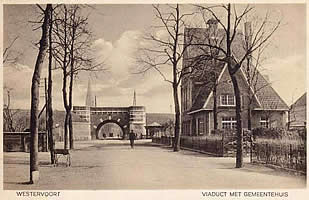
Johan Andreas dèr Mouw (24 juli 1863 – 8 juli 1919)
Westervoort op een oude ansichtkaart
De Japanse schrijfster Banana Yoshimoto werd geboren op 24 juli 1964 inTokyo. Zie ook alle tags voor Banana Yoshimoto op dit blog.
Uit : Kitchen (Vertaald door Megan Backus)
“Not at all,” he said. “Did you decide on a place to live yet?”
“Not even close.” I smiled.
“I see.”
“Would you like to come in for some tea?”
“No. I’m on my way somewhere and I’m kind of in a hurry.” He grinned. “I just stopped by to ask you something. I was talking to my mother, and we were thinking you ought to come to our house for a while.”
“Huh?” I said.
“In any case, why don’t you come over tonight around seven? Here’s the directions.”
“Okay …” I said vacantly, taking the slip of paper.
“All right, then, good. Mom and I are both looking forward to your coming.” His smile was so bright as he stood in my doorway that I zoomed in for a closeup on his pupils. I couldn’t take my eyes off him. I think I heard a spirit call my name.
“Okay,” I said. “I’ll be there.”
Bad as it sounds, it was like I was possessed. His attitude was so totally “cool,” though, I felt I could trust him. In the black gloom before my eyes (as it always is in cases of bewitchment), I saw a straight road leading from me to him. He seemed to glow with white light. That was the effect he had on me.
“Okay, see you later,” he said, smiling, and left.
Before my grandmother’s funeral I had barely known him. On the day itself, when Yuichi Tanabe showed up all of a sudden, I actually wondered if he had been her lover. His hands trembled as he lit the incense; his eyes were swollen from crying. When he saw my grandmother’s picture on the altar, again his tears fell like rain. My first thought when I saw that was that my love for my own grandmother was nothing compared to this boy’s, whoever he was. He looked that sad.
Then, mopping his face with a handkerchief, he said, “Let me help with something.” After that, he helped me a lot.
Yuichi Tanabe … I must have been quite confused if I took that long to remember when I’d heard grandmother mention his name.”

Banana Yoshimoto (Tokyo, 24 juli 1964)
Cover
De Duitse schrijfster Rosemarie Schuder werd geboren op 24 juli 1928 in Jena. Zie ook alle tags voor Rosemarie Schuder op dit blog.
Uit: In der Mühle des Teufels
„Er hat geschrieben, jeder kann seine Beschwerde vortragen. Es wird Abhilfe geschaffen.” Siegmund schlug dem Wirt ermunternd auf die Schulter.
“Nach Möglichkeit, steht in dem Blatt”, meinte Baumgartner zurückhaltend. Nach einer Weile des Nachdenkens setzte er hinzu: “Ich wüßte schon, worüber ich mich beschweren könnt. Einer hat mir meinen Sack gestohlen, der Spinoll.”
“Pfui, du wirst doch nicht einen Kameraden verraten, du denkst wohl, dafür bekommst du eine Belohnung, ja?”
Der Wirt von Baumgarting fuhr betroffen zusammen.
“Verrat, mein Gott, ja, der Spinoll war einer von den Anführern, sie könnten ihn greifen …”
“Und aufhängen”, setzte Siegmund hinzu.
Der Wirt bekreuzigte sich hastig.
“Ich will nicht schuld sein am Tode eines Menschen. Die Rache ist mein, spricht der Herr. Ich will mich so billig an dem Spinoll nicht rächen, daß er mich bestohlen hat. Mag er’s mit Gott ausmachen. Und was soll ich beim Statthalter? Ich will mich über nichts beschweren. Will nicht die Aufmerksamkeit auf mich lenken. Leb wohl, Bruder, glaub kaum, daß wir uns noch einmal wiedersehen, es sei denn, du kommst zu mir als Gast nach Baumgarting. Aber als zahlender”, fügte er lachend hinzu und ging.
Sie kamen beide nicht weit. Die Reiter des Statthalters griffen sie auf. Sie wurden beschuldigt, sich im verbotenen Gebiet aufzuhalten. Die Reiter berechneten die zwanzig Meilen großzügig. Sie setzten ihre beiden Gefangenen auf Pferde und banden ihnen die Beine unter den Pferdebäuchen zusammen. Der Wirt jammerte leise vor sich hin, die Stricke schnitten schmerzend ein.”
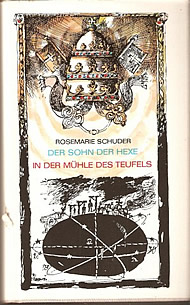
Rosemarie Schuder (Jena, 24 juli 1928)
Cover
De Duitse schrijversvrouw Katia Mann, steun en toeverlaat van de Duitse schrijver Thomas Mann, werd geboren als Katharina Pringsheim op 24 juli 1883 in Feldafing. Zie ook alle tags voor Katia Mann op dit blog.
Uit:Katia Mann: Meine ungeschriebenen Memoiren
“Die ersten Jahre bis zur Tertia hat mich noch ein Student, der ins Haus kam, um meine vier Brüder bei ihren Aufgaben zu beaufsichtigen, in den Fächern, die man bis zur Unter- oder Obertertia nimmt, unterrichtet; und das war eine Kleinigkeit. Von da ab hatte ich dann Gymnasiallehrer. Jeder kam die Woche vielleicht zwei Stunden; einer für die alten Sprachen, einer für Mathematik und einer für Deutsch und Geschichte. Das Ganze war ja furchtbar leicht, und ich lernte nicht schwer. Es ging sehr schnell. Wenn man allein ist, lernt man viel schneller. In der Schule muß man sich immer nach dem Durchschnitt oder dem Unterdurchschnitt richten, und ich gehörte zum oberen Durchschnitt. Im letzten Jahre hatte ich dann noch Unterricht bei einem Religionsprofessor des Gymnasiums, einem Dr. Engelhardt. Mit dem las ich das Neue Testament auf Griechisch. Religion war ja Pflichtfach am Gymnasium. Ich kann mich erinnern, daß wir einmal zu der Geschichte kamen, wie Jesus die Samariterin trifft und zu ihr sagt: Fünf Männer hast du gehabt, und der, mit dem du jetzt lebst, ist nicht dein Mann. Da wurde der Lehrer etwas verlegen und er kommentierte: Das findet man so in der Vorstadt. So ging es bis zu meinem siebzehnten Jahr. Dann machte ich gemeinsam mit dem Zwillingsbruder als Externe das Abitur am Wilhelms-Gymnasium. Es verlief glänzend. Nun sollte ich auch etwas studieren. Ich ging auf die Universität und hörte vor allem Naturwissenschaften. Bei Röntgen Experimentalphysik und bei meinem Vater Mathematik: Infinitesimal-, Integral-und Differentialrechnung und Funktionstheorie. Aber ich bin noch immer der Meinung, daß ich für diese Fächer keine besondere Veranlagung hatte. Einer meiner Brüder, Peter, der zweitälteste, studierte auch Physik. Er ist ein sehr guter Physiker geworden. Ich war gar nicht dafür prädestiniert, und Röntgen hielt auch gar nichts von mir. Beim Experimentieren passierte mir einmal etwas sehr Mißliches. Ich warf einen Apparat hin. Das hat Röntgen mir sehr übelgenommen. Ich hätte es wahrscheinlich in diesem Fach nie zu etwas gebracht, und auch für Mathematik fand ich mich gar nicht sehr begabt. Ich hätte es auch da nicht sehr weit gebracht. Es war eigentlich mehr so töchterliche Anhänglichkeit. Ich hab’s auch alles vergessen. Vielleicht hätte ich zu Ende studiert und auch Examina gemacht. Ich hatte ja erst vier oder sechs Semester studiert, als ich heiratete, und wie ich dann verheiratet war, kam bald das erste Baby, und dann sofort das zweite Baby, und sehr bald kam dann das dritte und vierte.“
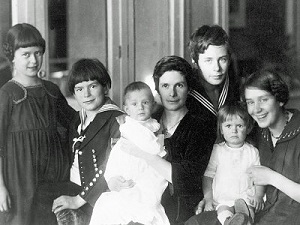
Katia Mann (24 juli 1883 – 25 april 1980)
Katia Mann met haar 6 kinderen in 1919 (van links naar rechts: Monika, Golo, Michael, Katia Mann, Klaus, Elisabeth en Erika)
De Japanse schrijver Junichirō Tanizaki werd geboren in Tokio op 24 juli 1886. Zie ook alle tags voor Junichirō Tanizaki op dit blog.
Uit:In Praise of Shadows (Vertaald door Thomas Harper en Edward Seidensticker)
“What incredible pains the fancier of traditional ar-chitecture must take when he sets out to build a house in pure Japanese style, striving somehow to make electric wires, gas pipes, and water lines har-monize with the austerity of Japanese rooms—even someone who has never built a house for himself must sense this when he visits a teahouse, a restaurant, or an inn. For the solitary eccentric it is another matter, he can ignore the blessings of scientific civilization and retreat to some forsaken corner of the countryside) but a man who has a family and lives in the city cannot turn his back on the necessities of modem life—heating, electric lights, sanitary facilities—merely for the sake of doing things the Japanese way. The purist may rack his brain over the placement of a single tele-phone, hiding it behind the staircase or in a corner of the hallway, wherever he thinks it will least offend the eye. He may bury the wires rather than hang them in the garden, hide the switches in a closet or cupboard, run the cords behind a folding screen. Yet for all his ingenuity, his efforts often impress us as nervous, fussy, excessively contrived. For so accustomed are we to electric lights that the sight of a naked bulb beneath an ordinary milk glass shade seems simpler and more natural than any gratuitous attempt to hide it. Seen at dusk as one gazes out upon the countryside from the window of a train, the lonely light of a bulb under an old-fashioned shade, shining dimly from behind the white paper shoji of a thatch-roofed farmhouse, can seem positively elegant. But the snarl and the bulk of an electric fan remain a bit out of place in a Japanese room. The ordinary householder, if he dislikes electric fans, can simply do without them. But if the family business involves the entertainment of own tastes at the expense of others. A friend of mine, the proprietor of a Chinese restaurant called the Kairakuen, is a thoroughgoing purist in matters archi-tectural. He deplores electric fans and long refused to have them in his restaurant, but the complaints from customers with which he was faced every summer ul-timately forced him to give in. »

Junichirō Tanizaki (24 juli 1886 – 30 juli 1965)
De Duitse dichter, schrijver en acteur Frank Wedekind werd geboren in Hannover op 24 juli 1864. Zie ook alle tags voor Frank Wedekind op dit blog.
Uit: Frühlings Erwachen
„Melchior Das ist mir zu langweilig. Ich mache nicht mehr mit.
Otto Dann können wir andern nur auch aufhören! – Hast du die Arbeiten, Melchior?
Melchior Spielt ihr nur weiter!
Moritz Wohin gehst du?
Melchior Spazieren.
Georg Es wird ja dunkel!
Robert Hast du die Arbeiten schon?
Melchior Warum soll ich denn nicht im Dunkeln spazierengehn?
Ernst Zentralamerika! – Ludwig der Fünfzehnte! Sechzig Verse Homer! – Sieben Gleichungen!
Melchior Verdammte Arbeiten!
Georg Wenn nur wenigstens der lateinische Aufsatz nicht auf morgen wäre!
Moritz An nichts kann man denken, ohne daß einem Arbeiten dazwischenkommen!
Otto Ich gehe nach Hause.
Georg Ich auch, Arbeiten machen.
Ernst Ich auch, ich auch.
Robert Gute Nacht, Melchior.
Melchior Schlaft wohl!
Alle entfernen sich bis auf Moritz und Melchior.
Melchior Möchte doch wissen, wozu wir eigentlich auf der Welt sind!
Moritz Lieber wollt’ ich ein Droschkengaul sein um der Schule willen! – Wozu gehen wir in die Schule? – Wir gehen in die Schule, damit man uns examinieren kann! – Und wozu examiniert man uns? – Damit wir durchfallen. – Sieben müssen ja durchfallen, schon weil das Klassenzimmer oben nur sechzig faßt. – Mir ist so eigentümlich seit Weihnachten… hol mich der Teufel, wäre Papa nicht, heut noch schnürt’ ich mein Bündel und ginge nach Altona!
Melchior Reden wir von etwas anderem. –

Frank Wedekind (24 juli 1864 – 9 maart 1918)
Scene uit de gelijkamige film uit 2009
De Franse dramaturg en schrijver Alexandre Dumas père werd geboren in (Villers-Cotterêts (Aisne) op 24 juli 1802. Zie ook alle tags voor Alexandre Dumas père op dit blog.
Uit: The Three Musketeers (Vertaald doorWilliam Barrow)
« By the latter I mean your relatives and friends. Endure nothing from anyone except Monsieur the Cardinal and the king. It is by his courage, please observe, by his courage alone, that a gentleman can make his way nowadays. Whoever hesitates for a second perhaps allows the bait to escape which during that exact second fortune held out to him. You are young. You ought to be brave for two reasons: the first is that you are a Gascon, and the second is that you are my son. Never fear quarrels, but seek adventures. I have taught you how to handle a sword; you have thews of iron, a wrist of steel. Fight on all occasions. Fight the more for duels being forbidden, since consequently there is twice as much courage in fighting. I have nothing to give you, my son, but fifteen crowns, my horse, and the counsels you have just heard. Your mother will add to them a recipe for a certain balsam, which she had from a Bohemian and which has the miraculous virtue of curing all wounds that do not reach the heart. Take advantage of all, and live happily and long. I have but one word to add, and that is to propose an example to you– not mine, for I myself have never appeared at court, and have only taken part in religious wars as a volunteer; I speak of Monsieur de Tréville, who was formerly my neighbor, and who had the honor to be, as a child, the play-fellow of our king, Louis XIII, whom God preserve! Sometimes their play degenerated into battles, and in these battles the king was not always the stronger. The blows which he received increased greatly his esteem and friendship for Monsieur de Tréville. Afterward, Monsieur de Tréville fought with others: in his first journey to Paris, five times; from the death of the late king till the young one came of age, without reckoning wars and sieges, seven times; and from that date up to the present day, a hundred times, perhaps! So that in spite of edicts, ordinances, and decrees, there he is, captain of the Musketeers; that is to say, chief of a legion of Caesars, whom the king holds in great esteem and whom the cardinal dreads–he who dreads nothing, as it is said. Still further, Monsieur de Tréville gains ten thousand crowns a year; he is therefore a great noble. He began as you begin. Go to him with this letter, and make him your model in order that you may do as he has done.”
Upon which M. D’Artagnan the elder girded his own sword round his son, kissed him tenderly on both cheeks, and gave him his benediction. “
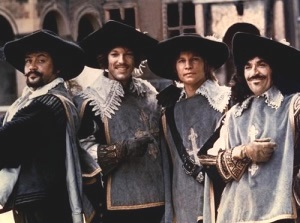
Alexandre Dumas père (24 juli 1802 – 5 december 1870)
Scene uit de gelijknamige film uit 1973
De Nederlandse schrijfster Betje Wolff (eig. Elizabeth Bekker) werd geboren in Vlissingen op 24 juli 1738. Zie ook alle tags voor Betje Wolff op dit blog.
Uit:Historie van mejuffrouw Sara Burgerhart (Samen met Aagje Deken)
“Ik moest mynen vorigen, die hier nevens gaat, zo schielyk afbreken, om dat Tante my riep, schoon zy my niets te zeggen hadt, en slegts beval, by haar te zitten: Onze gromparty sla ik maar over, om dat ik u nu eens ernstig moet schryven.
Myn waarde Vader, weet gy, was Jan Burgerhart; hy negotieerde in de Thee; zyn handel was voordeelig. Myne lieve Moeder was, zo als men dat noemt, een bestorven Meisje. Zy hadt een stuiver goeds, en trouwde zeer jong. My, het eenig kind, voedde men op als een meisje, dat van eene goede familie is, en geld te wagten heeft, door brave Ouders opgevoed wordt. Gy kent myn aandoenlyk hart; gy weet hoe vatbaar het is voor de minste blyken van genegenheid; oordeel dan hoe ik deeze myne dierbare Ouders eerde en beminde. Ouders! dat is toch een zielroerend woord, Antje, en kost my meermaal eene stille traan. Myne Ouders waren gelukkig met elkander. Hun karakter was voor elkander berekent.
Meer zeg ik niet. Wie spreekt ooit dan met achting van myne zalige Ouders? och, yder een! …. Gy weet het. Hoe aangenaam was ons zeer geregeld huishouden! Myne Ouders lazen veel, en zagen deeze zucht in my met goedkeuring. Nog zie ik hen in onzen tuin, op de bank zitten, als Vader zyn pypje van rust, zo als hy het noemde, rookte, en Moeder hem iets voorlas, terwyl ik op des goedaartigen mans knie zat te luisteren, of te spelen. Nog zie ik hoe hy my, gevolgt door myne glimlachende Moeder, in huis draagt. ô! Dat waren gouden dagen; waren het niet?
Myne Moeder hadt eene Zuster, die veel ouder was, en waar by ik nu inwoon. Die Zuster vondt maar gansch niet billyk, dat Saartje vóór haar ten huwelyk verzogt wierd, en kyk, de Juffrouw was magtig gestelt op het Decorum; dat was het maar: zy meende ook zeer wel te weten, dat zy zo wel veel meer verdiensten, als jaren telde, dan myne Moeder. Doch, of het spel sprak, daar kwamen geene Liefhebbers. Indien onze Vriendin hadt kunnen bewogen worden, om eene aanpryzende voorrede voor Tante te schryven, mooglyk zou men haar gezogt hebben. Hoe ’t zy – (verschoon dien inval!) zy begreep, (Tante heeft ook haare invallen, Antje,) dat er geen beter party voor haar opzat, dan zich te voegen by die Lieden, die wy fynen, en die zich zelf vroomen noemen.”
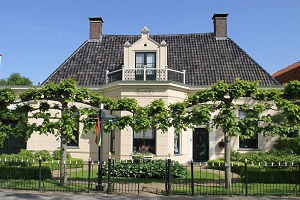
Betje Wolff (24 juli 1738 – 5 november 1804)
Het Betje Wolff Museum in Middenbeemster
Zie voor nog meer schrijvers van de 24e juli ook mijn blog van 24 juli 2016 deel 2.
